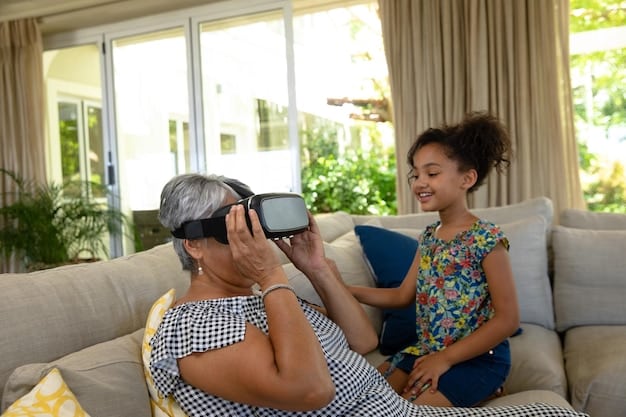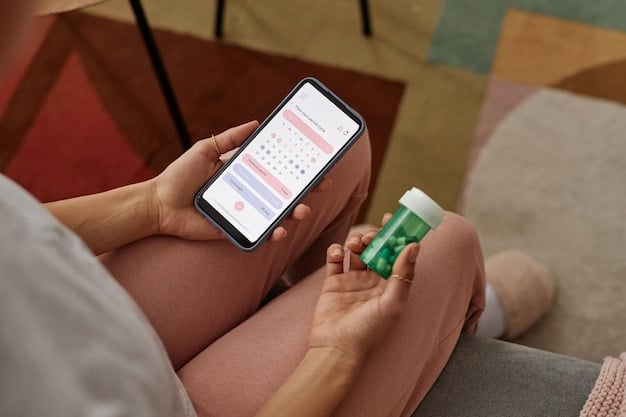Tech for Caregivers: 5 Time & Money-Saving Apps & Devices

Technology plays a crucial part in modern caregiving by offering innovative solutions to streamline tasks, reduce costs, and enhance the quality of life for both caregivers and their loved ones, through apps and devices.
Caregiving can be both rewarding and demanding, often requiring significant time, energy, and financial resources. However, the role of technology in caregiving: 5 apps and devices that can save you time and money has revolutionized how caregivers approach their responsibilities, offering efficient and cost-effective solutions to ease the burden.
The Increasing Importance of Technology in Caregiving
The demands on caregivers are constantly growing, and as the world’s population ages, the need for efficient caregiving solutions becomes more pressing. Technology is no longer a luxury but a necessity for individuals juggling caregiving duties with their own personal and professional lives. Innovations in technology allow caregivers to manage tasks more efficiently, monitor the well-being of their loved ones remotely, and even reduce the costs associated with long-term care.
Incorporating technology into caregiving isn’t about replacing human interaction; it’s about enhancing it. By automating routine tasks and providing real-time health data, caregivers can focus on providing emotional support and companionship, significantly improving the quality of care. This shift can also free up valuable time, enabling caregivers to maintain their own mental and physical health, which is critical for sustainable caregiving.
Medication Management Apps: Ensuring Timely Doses
One of the most critical aspects of caregiving is ensuring that medications are taken on time and in the correct dosage. Missed doses or errors in medication can lead to serious health complications, making medication management a top priority. Thankfully, numerous apps are designed to streamline this process, offering reminders, tracking, and even alerts for refills.
Benefits of Medication Management Apps
These apps offer several key benefits that make them invaluable tools for caregivers:
- Timely Reminders: Alerts notify caregivers and patients when it’s time to take medication, reducing the risk of missed doses.
- Dosage Tracking: Keep a detailed record of when medications were taken and in what dosage, helping to monitor adherence.
- Refill Alerts: Notifications remind caregivers to refill prescriptions before they run out, avoiding interruptions in medication schedules.
- Interaction Warnings: Some apps provide warnings about potential drug interactions, enhancing safety.
Popular Medication Management Apps
Several highly-rated apps can assist with medication management. These include:
- Medisafe Medication Reminder: A user-friendly app that sends reminders, tracks dosages, and offers refill alerts.
- Pill Reminder by Drugs.com: Provides comprehensive medication information and customizable reminders.
- MyTherapy: An all-in-one app that combines medication reminders with a health journal and activity tracking.
Medication management apps can significantly reduce the stress and complexity associated with medication schedules. By providing reliable reminders and tracking, caregivers can have peace of mind knowing that their loved ones are adhering to their prescribed treatments. This not only improves health outcomes but also frees up time for other important caregiving tasks.

Remote Monitoring Devices: Keeping an Eye from Afar
Remote monitoring devices offer caregivers the ability to keep track of their loved ones’ well-being, even when they can’t be physically present. These devices range from simple wearable sensors to sophisticated home monitoring systems, providing valuable insights into a person’s daily activities, health metrics, and safety.
These devices have become increasingly sophisticated, offering features like fall detection, GPS tracking, and even two-way communication. By leveraging these technologies, caregivers can ensure their loved ones are safe and well-cared for, regardless of distance.
Types of Remote Monitoring Devices
There are several types of remote monitoring devices available, each offering unique benefits:
- Wearable Health Trackers: Devices like smartwatches and fitness trackers monitor heart rate, sleep patterns, and activity levels.
- Home Monitoring Systems: These systems use sensors to track movements, door openings, and other activities within the home.
- GPS Trackers: Small, portable devices that allow caregivers to track the location of their loved ones, useful for those prone to wandering.
- Smart Pill Dispensers: Automated dispensers that release medication at the correct time and notify caregivers if a dose is missed.
Benefits of Remote Monitoring
Remote monitoring can provide numerous benefits for caregivers and their loved ones:
- Peace of Mind: Knowing that you can monitor your loved one’s well-being from afar reduces anxiety and stress.
- Early Detection of Issues: Receive alerts for falls, missed medications, or unusual activity patterns.
- Improved Response Time: React quickly to emergencies, potentially preventing serious health outcomes.
Remote monitoring devices are a powerful tool for enhancing the safety and well-being of individuals receiving care. By providing real-time data and alerts, these devices empower caregivers to make informed decisions and respond promptly to any potential issues. This technology not only supports independent living but also strengthens the caregiver-patient relationship through enhanced communication and awareness.
Smart Home Devices: Automating Daily Tasks
Smart home devices can play a significant role in streamlining daily tasks and making life easier for both caregivers and their loved ones. From automated lighting and temperature control to voice-activated assistants, these devices can enhance comfort, safety, and convenience.
Integrating smart home technology into the caregiving environment can transform daily routines and reduce the physical and mental strain on caregivers. These devices are designed to adapt to individual needs, offering personalized solutions that improve overall quality of life.
Examples of Useful Smart Home Devices
Here are some specific examples of how smart home devices can assist with caregiving:
- Smart Lighting: Automated lighting systems can be programmed to adjust based on time of day or motion, reducing the risk of falls.
- Smart Thermostats: Remotely control the temperature to ensure a comfortable environment for your loved one.
- Voice-Activated Assistants: Devices like Amazon Echo or Google Home can be used to set reminders, make calls, and control other smart devices with voice commands.
- Smart Locks: Keyless entry systems can provide secure and convenient access for caregivers and family members.
Additional Benefits
Consider also these other benefits:
- Enhanced Safety: Smart devices can help prevent accidents and ensure a safe living environment.
- Increased Independence: By automating tasks, individuals can maintain greater independence and control over their daily lives.
- Reduced Caregiver Burden: Automating routine tasks frees up time for caregivers to focus on more important aspects of care.

Smart home devices offer a wide range of possibilities for improving the caregiving experience. By automating daily tasks, enhancing safety, and promoting independence, these technologies can significantly reduce the burden on caregivers and improve the quality of life for individuals receiving care. Investing in smart home solutions can be a cost-effective way to ensure a comfortable, safe, and supportive environment for your loved ones.
Communication Tools: Staying Connected and Informed
Effective communication is essential in caregiving, and technology offers numerous tools to help caregivers stay connected with their loved ones, family members, and healthcare providers. These tools enable real-time updates, coordination of care, and emotional support, regardless of physical distance.
Video Conferencing
Video conferencing platforms like Zoom, Skype, and FaceTime allow caregivers to conduct virtual check-ins, attend medical appointments remotely, and provide emotional support through face-to-face interactions.
Messaging Apps
Messaging apps like WhatsApp, Signal, and Telegram facilitate quick and easy communication among caregivers, family members, and healthcare providers. These apps enable the sharing of updates, photos, and important information, ensuring everyone stays informed.
Caregiver Coordination Platforms
Websites like Lotsa Helping Hands and CaringBridge offer platforms for coordinating care schedules, sharing updates, and requesting assistance from family and friends. These platforms streamline communication and help distribute caregiving responsibilities.
Robust communication tools offer several benefits that improve the caregiving process and enhance the well-being of everyone involved. These include:
- Enhanced Coordination: Ensuring that all members of the care team are on the same page.
- Emotional Support: Maintaining family connection and support.
- Quick Information Sharing: Updating those who need to know, quickly and easily.
By leveraging these communication tools, caregivers can create a strong support network, stay informed about their loved one’s condition, and coordinate care effectively. This not only reduces stress and improves efficiency but also strengthens relationships and fosters a sense of community.
Financial Management Apps: Budgeting and Saving
Caregiving often comes with significant financial burdens, including medical expenses, home modifications, and caregiving services. Financial management apps can help caregivers budget, track expenses, and identify potential savings opportunities.
Effective financial management is crucial for ensuring that caregivers can provide the best possible care without compromising their own financial stability. These apps offer a range of tools and resources to help manage expenses, save for future needs, and make informed financial decisions.
Examples of Financial Management Apps
These apps include:
- Mint: A comprehensive budgeting app that tracks income, expenses, and investments.
- YNAB (You Need a Budget): A budgeting app that helps users allocate their income to specific categories and goals.
- Personal Capital: Financial planning and wealth management tools.
Utilizing financial management tools provides multiple benefits:
- Budgeting and tracking: Maintaining income and expenses.
- Expense Identification: Identifying waste while looking for better options.
- Tax Assistance: Maximizing tax deductions.
Financial management apps are essential tools for caregivers seeking to navigate the financial complexities of caregiving. By providing budgeting tools, expense tracking, and savings strategies, these apps empower caregivers to make informed decisions, manage their resources effectively, and secure their financial future. This comprehensive approach ensures that caregivers can focus on providing the best possible care without sacrificing their financial well-being.
| Key Point | Brief Description |
|---|---|
| 💊 Medication Management | Apps ensure timely doses and track adherence. |
| 👁️ Remote Monitoring | Devices monitor health and safety from a distance. |
| 🏡 Smart Home | Automation enhances comfort and independence. |
| 💬 Communication Tools | Staying connected with loved ones and caregivers. |
Frequently Asked Questions
▼
Medication reminder apps like Medisafe and Pill Reminder by Drugs.com provide notifications and dosage tracking to help caregivers ensure timely medication adherence for their loved ones, reducing missed doses.
▼
Remote monitoring devices enable caregivers to track a loved one’s health and safety remotely, providing alerts for falls or unusual activity and offering peace of mind when physical presence isn’t possible.
▼
Caregiver coordination platforms such as Lotsa Helping Hands and CaringBridge help families coordinate care schedules, share updates, and request assistance from friends and family, streamlining communication and support.
▼
Yes, smart home devices like automated lighting, smart thermostats, and voice-activated assistants can enhance safety, comfort, and convenience for both caregivers and their loved ones, making daily tasks easier.
▼
Financial management apps like Mint and YNAB help caregivers budget, track expenses, and identify savings opportunities, ensuring they can manage caregiving costs without compromising their financial stability.
Conclusion
Technology offers an invaluable toolkit for caregivers, providing solutions to streamline tasks, reduce expenses, and enhance the quality of care. By leveraging these apps and devices, caregivers can manage their responsibilities more efficiently, ensuring their loved ones receive the best possible support while maintaining their health and well-being.





